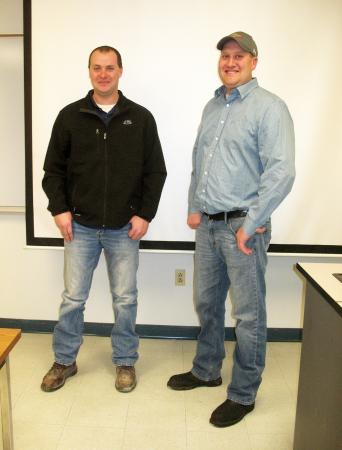University News
WIU Alumnus Honored in National Agricultural Commodity Competition
March 19, 2018
MACOMB, IL -- A Western Illinois University alumnus and one of his farmer clients have been honored by the Fertilizer Institute as one of Five National 4R Advocate Teams during the 2018 Commodity Classic in Anaheim, Ca.
Kyle Lake, a 2006 WIU agriculture alumnus, is a sales agronomist for CHS Carrollton, a Greene County location for the nation's largest farmer cooperative. Lake is helping client farmers Maria Cox, and her father, Ethan to implement 4R Nutrient Stewardship practices. This involves "right source, right rate, right time and right placement" of nutrients as well as conservation practices such as cover crops.
"It has been a great learning experience trying new practices that help maintain the soil health and benefit the environment," said Lake.
Lake began working with the Cox family in 2012, but the family has been a client of CHS Carrollton for more than 30 years.
Lake is combining his knowledge of agronomy and precision agriculture technology to make the farm's field operations as efficient and profitable as possible.
"Maria realizes that in order to sustain a profitable farm, you must sustain the land you use," said Lake. "As young farmers, the 4R Nutrient Stewardship Principles will have a huge impact on how we feed the world."
Lake and his younger brother, Scott, a 2010 WIU agriculture alumnus also employed by CHS-Carrollton, were back on the WIU campus recently speaking to students in a nutrient management class taught by WIU School of Agriculture Associate Professor Joel Gruver.
"We talked about different 4R practices that we are utilizing in agriculture in order to keep nutrients from leaving fields and ending up in our streams and rivers," said Lake. "The 4R Principles are about putting the right rate of fertilizer on for the crop that we are planning on growing. We are using yield data that we gather to make prescriptions to feed the crop. Using GPS we can put that fertilizer in right place in the field in order to keep from over applying in certain areas and under applying in others. We are also putting nutrients on at different times throughout the year in order to spoon feed the crop, thus making sure the nutrients are there when the crop needs it. We also talked about cover crops, the USDA's CRP program and buffer strips that farmers are utilizing on their farms as well."
For more information about the WIU School of Agriculture, visit wiu.edu/agriculture.
Posted By: University Communications (U-Communications@wiu.edu)
Office of University Communications & Marketing



Connect with us: